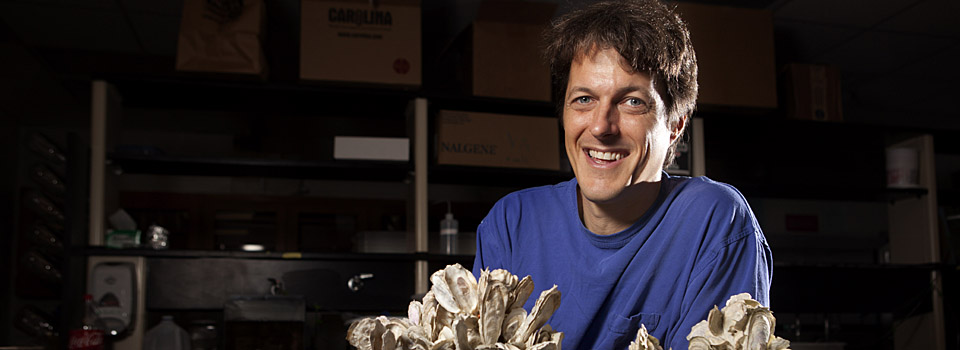Jeb Byers, an associate professor in the Odum School of Ecology, constantly strives to get students of all majors involved in research.
Where did you earn degrees and what are your current responsibilities at UGA?
I earned my B.S. in zoology from Duke University and my Ph.D. in ecology, evolution and marine biology from University of California, Santa Barbara. I am currently an associate professor of ecology in the Odum School of Ecology, where I have teaching and research responsibilities as well as some administrative duties, including serving as the coordinator of our graduate program.
When did you come to UGA and what brought you here?
I came to UGA in 2008. I was enticed by the focused attention and excitement on ecology in the Odum School and in supporting departments on campus. The breadth of research at UGA in the life sciences is quite stunning. There is an incredible number of excellent-caliber colleagues here with whom to collaborate. As a personal bonus, I grew up in the southern Appalachians, so it was fun to return to this neck of the woods.
What are your favorite courses and why?
“Ecology” (ECOL 3500) and “Ecosystems of the World” (ECOL 3880H). “Ecology” is fun because it is a required class for life science majors. I love being able to show students with other career interests how ecology is applicable to them. “Ecosystems of the World” is great fun because it is an Honors course with a smaller class size, so it engenders itself to a great classroom dynamic and interactions with students.
What interests you about your field?
Figuring out how the world works interests me. Mostly I work in areas of marine biology, and this is a topic that always has captivating species and topics to pursue.
What are some highlights of your career at UGA?
Last spring I was awarded the Richard B. Russell Award for Excellence in Undergraduate Teaching. This was truly a great honor recognizing the part of my job that really invigorates me—making light bulbs go off in students’ heads. I have had four active National Science Foundation grants in the last four years, which reflects the great interactive group of colleagues here and the rich natural system in which to work on the Georgia coast.
How does your research or scholarship inspire your teaching, and vice versa?
I constantly strive to get my undergrads involved in my research. I have up to eight to 10 undergraduate students working in my lab. At a larger scale, I use the lab section of courses to get students understanding the process of collecting their own data for analysis and write-up.
Describe your ideal student.
A student who has a deep curiosity, an intellectual edge and a cooperative attitude. It is important for the student to be driven, to be a good listener (to take advice well) and to be a team player.
Favorite place to be/thing to do on campus is…
Meeting on campus with my students is one of the most intellectually satisfying things to do (the courtyard in Ecology is a particularly good spot). The State Botanical Garden of Georgia is a fantastic oasis for meetings or walks.
Beyond the UGA campus, I like to…
Spend time with my family. With three young kids, there is never a dull moment.
Favorite book/movie?
“At the Water’s Edge: Fish with Fingers, Whales with Legs, and How Life Came Ashore but then Went Back to Sea,” by Carl Zimmer (the best science writer currently practicing). Zimmer explicates the most important and unifying concept in biology—evolution—in incredibly lucid and compelling detail using a topic (marine fish and mammals) that excites everyone.
Proudest moment at UGA?
When two of my graduate students landed National Science Foundation predoctoral fellowships in back to back years. These fellowships are one of the most prestigious awards a graduate student can win.


